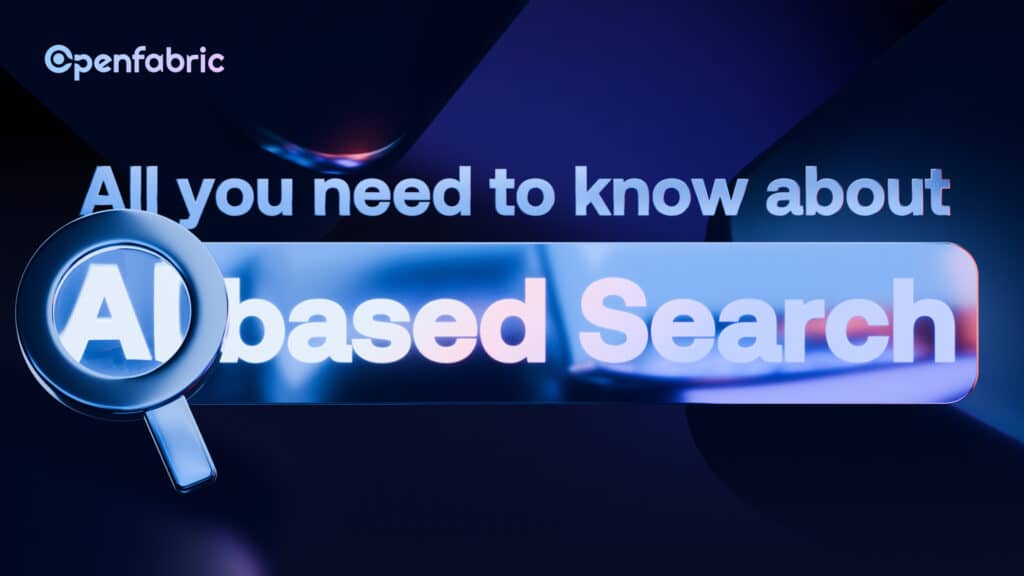
October 11, 2024 5 minutes read
All you need to know about AI based search

Traditional search engines use ranking techniques that try to link as many keywords as possible with web pages. Earlier, this worked for old online environments, these algorithms have now become old and are simply not enough. This is because unlike modern AI based search, they fail to capture semantics and meanings of searches. This makes their output unrelated or off topic.
Also, they do not consider the context of a word and often end up with conflicts or confusing performance. They tend to focus on the keyword placement and end up creating low-quality content. On the contrary, modern AI-based search overcomes these limitations efficiently. With the assistance of NLP technologies, machine learning, and knowledge graphs it provides advanced and specific search options.
AI based search engines have features that distinguish them from traditional search engines. In this article, we will discuss what AI-based search is, how it works, its advantages, and so on. Let’s get started!
What is AI based search?
AI-based search uses artificial intelligence to improve the search experience by providing more relevant results. This tech is designed on the basic principles of AI-powered algorithms that makes it easier to process and give information. The key to this technology is natural language processing (NLP), a branch of artificial intelligence that deals with the interaction between humans and computers. It enables the Artificial Intelligence system to understand the exact nature of the search queries and deliver relevant results.
In addition, AI search technology also uses machine learning algorithms as well. These algorithms allow the AI to acquire knowledge from the users’ behavior, adjust their algorithms in line with the new trends and enhance the overall quality of result. These algorithms also adapt and adjust to improve their performance and quality of results.
Furthermore, entity recognition, sentiment analysis, and question answering systems are technologies that play critical roles in AI-based search. Together, these technologies enable it to provide more accurate, relevant, and personalized results.
Benefits
- Increased accuracy: AI-based search understands the context and intent behind search queries. This reduces the likelihood of generating irrelevant results. Thus, it allows users to find the information they need efficiently, saving them the effort.
- Better user experience: This technology also provides personalized results that are tailored to individual users’ preferences and interests based on their queries. Personalized search results create a more intuitive and engaging search experience, and therefore increase user satisfaction and loyalty.
- Improved accessibility to information: In addition, It increases the accessibility to information for users. For example, voice search, enabled by NLP, allows users to search using natural language. Therefore, it makes search more accessible to people with disabilities or those in situations where typing is not possible.
- Faster search results: Due to its ability to tailor users’ results individually, using AI search technology reduces the time used to search for a specific information. In addition, it provides direct answers and even helps to summarize long documents from web pages. For example, Google Gemini summarizes users’ search results on the results page.
All these techniques give the user the specific information they need.
How does AI based search work?
The knowledge of the technologies integrated for AI search gives us a broad understanding. However, for a better understanding, we must see how this technology produces the results we see and use.
AI search uses a complex process to produce accurate results in a short amount of time. This process involves:
- Query analysis: This first step is the analysis of the users’ search query to identify keywords, entities, and search intent. This analysis spreads out the query to identify every possible search intent there can be.
- Contextual understanding: After a thorough analysis of the search query, it uses natural language processing (NLP) and machine learning algorithms to understand the particular context and meaning of the query input.
- Knowledge retrieval: With its ability to explore sources across the web, the Artificial intelligence uses knowledge graphs and databases to retrieve information that are relevant to the users’ search.
- Ranking and filtering: This is where AI search is better than traditional search. It ranks and filters results based on relevance, accuracy, and user preferences. Thus helping the user save time and effort put into searching for the most relevant and accurate information.
- Result generation: Finally, it generates a list of relevant results for use.
Current applications and the Future of AI based search
Already big companies like Google have already integrated their AI, Google Gemini, into search. Others include Amazon’s Alexa, Apple’s Siri and Microsoft Bing. Even social media platforms have incorporated AI based searches. For example, Facebook search, LinkedIn search and so on. All of these AI based search options are great, however, they are limited to one platform and are centralized.
However, Openfabric brings a new approach to AI search. It creates an Internet of AI where users will be able to find numerous Artificial Intelligence options to generate results based on their search queries. Utilizing Openfabric also addresses the problems with personal data privacy as faced by these centralized platforms. Openfabric is a decentralized platform, thus users have control over their personal data and how it is used.
Visit our MARKETPLACE to explore our tools for a better AI based search experience.
Conclusion
AI based search has changed the way information is being accessed and utilized across industries. Most importantly, it has greatly improved how users retrieve and engage with information. Its ability to produce precise and individualized results is now an important part of our daily usage of the internet. In industries such as e-commerce and healthcare, education and finance, AI search enhances the process of information search.
In conclusion, AI search is the next step in information technology. However, Openfabric AI takes this a step further. Through decentralization, it appropriately addresses the challenges such as data privacy and control faced by centralized platforms. By addressing these challenges, the possibilities with AI based search in information retrieval is vast. And as the field of AI search progresses, so will the way we seek out knowledge in the future.
Visit our WEBSITE today for more information and to explore our various tools.

